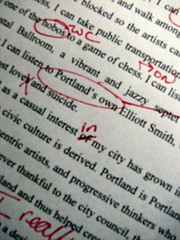Accepting that first drafts aren’t final drafts is a big milestone at the beginning of the journey to becoming a writer. The first couple things we write, we think that we have to—and will—get it perfect on the first pass through. It’s devastating to receive the news that our draft isn’t perfect—or even that good. It’s disheartening to think that what we thought needed a minor word-level edit actually needs a major character-and-plot-level overhaul.
But finally, we accept that our first drafts are just that—first drafts—and our writing is found in the rewriting of it. And for most of us, that means we don’t put quite as much effort into our first drafts, focusing more on getting the broad strokes down than getting the phraseology perfect.
 So when we’re drafting lazy, of necessity, we leave in some things that we know we’ll only end up taking out later—or we leave out some things that we know we can add later.
So when we’re drafting lazy, of necessity, we leave in some things that we know we’ll only end up taking out later—or we leave out some things that we know we can add later.
A few examples:
-
Leave in:
- clichés
- scene summaries (of scenes you do intend to show in real time)
- near-match words
- scenes that may or may not turn out to be tangents
- the boring bits
- Leave out:
- descriptions
- dialogue
- punctuation
- grammar check
- spell check
- voice (I think we may talk more about this later in the week)
What do you leave in or out of your first drafts?
Photo credit: Aaron Brown


Leave in:
o Random passages of nonsense
o sentence fragments
o I do spell check because I create a lot of SF terms and I don’t want to do it accentally
Leave out:
o Chapters
o Title
o formatting
o meaning
o motivations
Sentence fragments—good one. And I never have a title before a second draft—my file names are usually the names of one or more characters. And then the early title always changes.
I like to call myself a rather new writer and I just have a small question about voice. How exactly do you write without voice?
Sorry If this is some sort of really dumb question that everyone should know the answer to, but it just doesn’t make sense to me.
Maybe “a unique voice” might be a better descriptor. The short answer I’d give is to write clichés: to write the same phrases we always hear and use.
I’d recommend reading the linked article to get more in depth on that.
I tend to leave out showing and leave in telling. It’s just a lot faster for me to write that way, and then go back and fill in the descriptions that flesh out the scene.
I don’t leave out dialog, though. My characters start talking right from the beginning, and they don’t shut up. They do all tend to sound like a middle-aged man, though.
They do all tend to sound like a middle-aged man, though.
The link really does a great job in clearing things up. Thanks for putting it up.
@Don—Personally, I don’t understand how people can leave out dialogue, but some do. I tend to leave out descriptions. Sometimes, I have no mental image of a character (even a main character) until well into the story, so I can’t really put it in there, can I?
@J—the link was always there—I wouldn’t have even mentioned it if I hadn’t just seen her blog post.